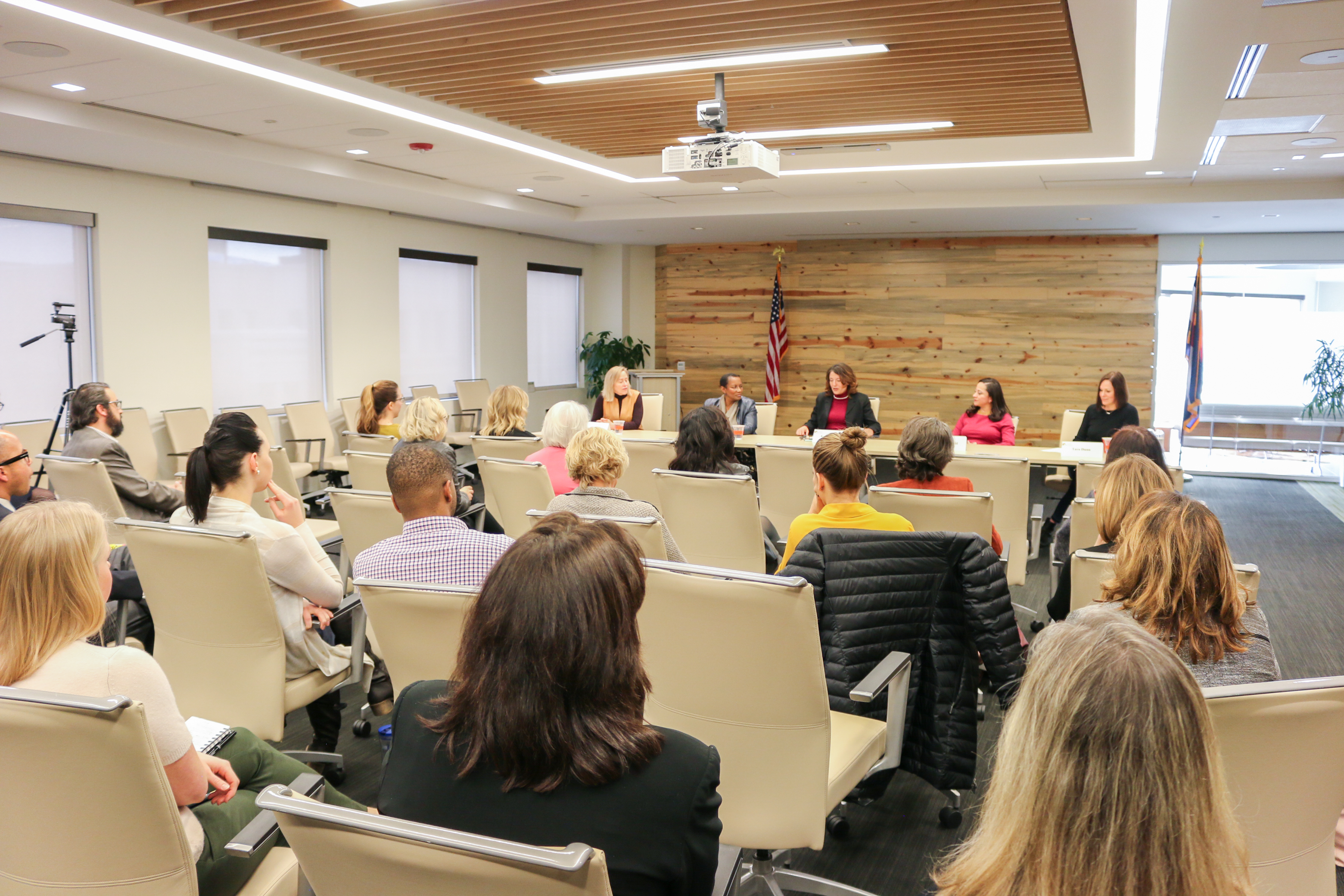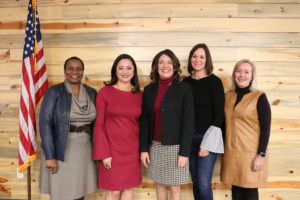
On Entrepreneurship, Mentors and Being the Only Woman in the Room
“Apparently today is the day women took over.”
That comment from Chamber President and CEO Kelly Brough was greeted by laughter and cheers as she introduced four women who run their own companies and lead at the Chamber and its affiliates – something that’s a first in the organization’s history.

Those women are Denise Burgess, Toti Cadavid, Carla Dore and Tara Dunn.
Burgess chairs the Chamber board of directors and in 2002 took over her family’s heating and cooling business and transformed it into an international construction management firm, Burgess Services.
Cadavid champions small business on the Denver Metro Small Business Development board of directors and runs her own small business – U-Fulfilled, a coaching and leadership development company.
Dore co-chairs the Metro Denver Economic Development Corporation’s Executive Committee, focused on growing jobs in the region, something she knows a thing or two about as president and CEO of office furniture dealer Workplace Resource.
Dunn was the 2017-18 board chair for the Denver Metro Chamber Leadership Foundation and has been an entrepreneur twice. She helped found Great Divide Brewing Company, and most recently she’s launched her own corporate law firm, HighMark Law.
They shared what they’ve learned from leading in business and the community – and how businesses can work to give more women access to leadership opportunities at a time when just one in five women holds a c-suite role and just one in 30 is a woman of color.
Brough: You all run your own companies and there are risks you take as entrepreneurs. What was that like for you, and did you find it different as a woman?
Burgess: Running my [family’s] business still felt risky. When you’re in construction you only get 20 percent of the jobs you apply for in the line of work I’m in, so 80 percent of the time you fail.
Cadavid: I think being an entrepreneur means risk. There’s nothing we do that isn’t risky. We hire an employee, it’s risky. We go for the wrong client, or the right one, and it’s a risk. I learned watching my mother. She’s a serial entrepreneur. I saw her succeed and fail, succeed and fail. I had in my blood knowing that even if you fail you can always succeed again.
Dore: My father owned his own business, too. I didn’t want to be in the family business and I thought I would want to be the furthest from owning my own business. Once you’re in the thick of it and you’re clear on what direction you want to go and you know your purpose is, it doesn’t matter if you’re a woman. I’m in a very male-dominated business as well. Before I bought the business from Herman Miller I was the only woman president of a dealership in North America.
Brough: My mom told me when I was little to understand the difference between loss and regret. A loss is you go and start your company and it doesn’t work, you fail and try again until it works. A regret is when you don’t ever try. Your stories are reinforcing my mother’s wisdom to go for the loss.
Dunn: I ended up deciding to go to law school with two five-year-olds to financially diversify our family. I worked my way out of the brewery job and I’ve practiced law at really big law firms and also at a publicly traded company. I found myself thinking about what I was going to do next and someone suggested starting my own corporate law practice. I was like, “Hand me a paper bag, please,” because the thought of doing that was so hard. It was really hard to get brave enough to do this, but I realized the worst thing that would happen is I’m going to be looking for a job.
Brough: I do think the fear of failure helps you drive the success. OK, let’s talk about mentors – who has helped you in your careers?
Cadavid: When I launched the agency back in 2002, I said who’s going to be my mentor? I researched the most successful Latina entrepreneur. That was Ana Quintana. I wrote her an email and she said, “Bring me a business plan.” It pushed me to come up with everything. I went and over the years we’ve become very good friends. Because my mom had been an entrepreneur many times over, any time I was in a risky position, I called her. She is the most amazing, business savvy coach I have ever had.
Burgess: Mine was my dad, but I also looked out in the landscape. I was told I had to meet Barb Grogan, the first female chair of the Chamber. She owned Western Industrial and she was in construction years before I was, so she’s still a mentor today. She always says to take a step back and look at it in a different way.
Dunn: My mom was a high school algebra teacher when my dad was in the Navy and she had kids and became a stay-at-home mom. In her 30s, out of nowhere, she decided she was going to enroll in a master’s program at the Colorado School of Mines. She got her PhD and graduated at 40 with a 4.0. Then she became the CFO of a major oil and gas company that she and the CEO took public when I was a teenager. That was such an amazing model for me. I didn’t even realize how much it was in my blood … when something needs to be different, you do something different. I call her about all kinds of wicked business problems.
Brough: You just told every working mom there are a lot of ways to model for your children – even though there are losses in that decision, there’s a great gift that you’re giving your kids.
Dore: Early on, I started very entry-level at the company I now own. I had a very important client who owned her own business and we just really connected. She to this day is a really important client, but I probably learned more from her about being comfortable with the risk. Once I earned her business it was great to have her as the person I could call.
Brough: Let’s talk about women in executive roles: Let’s talk a little bit about how we change those numbers.
Cadavid: It starts with something as simple and as difficult as believing we can. Really big things in life are only achieved when you believe you can do it. It also requires us to be conscious. Sometimes we can lend a hand and bring somebody in, but sometimes we have to push.
Brough: Was there someone in your career who said you’re capable of doing more?
Dore: For me it was my dad. It was, “You will find your path and you will succeed because you can do whatever you want.” You find those people in your life that have that same demeanor. You go towards those people who are going to build you up. It makes a big difference.
Brough: Being the only woman in the room is hard, too.
Cadavid: It’s about what you believe about yourself. If we are able to grab to that little piece that says you’re here because you belong. There’s a reason you were invited to be at this table, so can you just bring out the best in you instead of all the fears? When I mentor people that’s what I say to them. We can see other people’s talents and gifts, and sometimes we cannot see our own.
Brough: What one piece of advice do you have for others?
Dunn: I think that work-life balance is really more about prioritizing things in your life. I don’t think you’re balancing all things in the same way all the time. I made a list about five or six years ago of the five things that I thought were most important for me to be doing. They’re related to my work, my family, taking care of myself, and one of the things I realized is that at different times one thing might be getting 90 percent of my energy. If you can get comfortable that not everything gets equal attention all the time, you can give yourself room. The one that never changes is that taking care of myself always has to be number one.
Cadavid: I spent 20 years of my life going after success that was decided by society or somebody else and making myself really miserable. It wasn’t until I decided what success was for me that I stopped everything. Success over time changes, but we should always know what success looks like for us.
Burgess: If I don’t prioritize me, I’m not able to give anything. I learned that in my 40s. I would say to really take care of yourself. It’s really hard to give of yourself if you’re not taking care of yourself.
Dore: Find those people that will give you honest, objective feedback, because it is how you grow. You’ve got to find those people who you trust. The other thing I’d say is learn the difference between how important it is to be effective versus being right – they’re two big differences and we get confused about that all the time.
Brough: Part of living is discovering ourselves, and we know who that person is when we’re in our 20s but don’t let them out. Let that person out, because I do think greater success comes faster and is much more rewarding when we do.
Sara Crocker is the communications manager for the Denver Metro Chamber.
